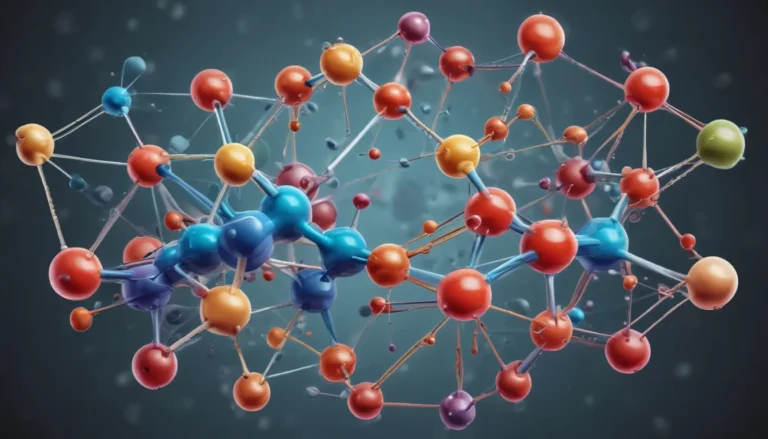A Note About Images: The images used in our articles are for illustration purposes only and may not exactly match the content. They are meant to engage readers, but the text should be relied upon for accurate information.
Are you ready to embark on a fascinating journey into the realm of chemistry? Lewis bases, named after the renowned chemist Gilbert N. Lewis, are a captivating topic that plays a vital role in numerous chemical reactions. These compounds are key players in the world of chemistry, influencing everything from acid-base reactions to coordination chemistry. Join us as we unravel the secrets of Lewis bases and explore 12 mind-blowing facts that are sure to leave you in awe.
Exploring the World of Lewis Bases
Lewis bases are like chemical matchmakers, facilitating the formation of new compounds by donating electron pairs to Lewis acids. These compounds are essential in a wide range of scientific disciplines, from catalyzing reactions to forming metal complexes. Let’s dive deeper into the captivating world of Lewis bases and uncover the fascinating facts that make them so remarkable.
Understanding Acid-Base Reactions
At the core of chemistry lies acid-base reactions, and Lewis bases play a crucial role in this fundamental principle. By providing the electron pair needed to bond with a Lewis acid, Lewis bases participate in the creation of new compounds, driving chemical reactions forward.
The Classification of Lewis Bases
Lewis bases can be classified as either hard or soft, depending on their electrostatic properties. Hard bases have a stronger affinity for hard acids, while soft bases prefer to interact with soft acids, showcasing the diversity of Lewis base interactions.
The Role of Lewis Bases in Coordination Chemistry
Coordination compounds, characterized by a central metal ion surrounded by ligands, heavily rely on Lewis bases to donate electron pairs. This interaction forms coordination bonds, contributing to the stability and uniqueness of these compounds.
Forming Metal Complexes with Lewis Bases
Many Lewis bases have the ability to form coordinate bonds with metal ions, resulting in the formation of stable metal complexes. These complexes exhibit distinctive chemical and physical properties, highlighting the versatility of Lewis bases.
The Formation of Lewis Acid-Base Adducts
When a Lewis base donates an electron pair to a Lewis acid, an adduct is formed. These temporary species are crucial in numerous chemical reactions, providing insights into a wide range of chemical transformations.
The Role of Lewis Bases in Organic Chemistry
In organic chemistry, Lewis bases can modify the reactivity of organic molecules by influencing their electrostatic environment. This interaction plays a significant role in various chemical transformations, impacting the synthesis of complex organic compounds.
Applications of Lewis Bases in Scientific Disciplines
Lewis bases are widely studied and utilized in various scientific fields, including medicinal chemistry, materials science, and environmental chemistry. Their essential role in chemical reactions has attracted significant attention from researchers, highlighting their significance across diverse disciplines.
Unraveling Complex Structures with Lewis Bases
When Lewis bases and acids interact, they form Lewis acid-base complexes ranging from simple to highly complex structures. These interactions provide valuable insights into the nature of chemical bonding and the behavior of compounds in various environments.
Catalytic Abilities of Lewis Bases
Some Lewis bases can act as catalysts in specific chemical reactions by activating substrates or reagents. This catalytic role enhances the rate of chemical reactions, showcasing the versatility of Lewis bases in driving chemical transformations.
Incorporating Hydrogen Bonding with Lewis Bases
In addition to forming coordinate bonds with Lewis acids, Lewis bases can engage in hydrogen bonding interactions with hydrogen-containing compounds. This unique interaction further extends the role of Lewis bases in chemical bonding and reactivity.
Delving Deeper into the World of Chemistry
As we continue to explore the world of chemistry, the study of Lewis bases will undoubtedly uncover even more fascinating facts. From their diverse applications to their fundamental role in chemical reactions, Lewis bases offer a wealth of opportunities for discovery and innovation in the field of chemistry.
Conclusion
In conclusion, Lewis bases are essential components of many chemical reactions and have a profound impact on various scientific disciplines. Understanding their properties and interactions with Lewis acids provides valuable insights into the complexity of chemical systems. The mind-blowing facts presented here offer a glimpse into the intriguing world of Lewis bases, emphasizing their significance in the realm of chemistry and beyond.
FAQs
Q: What is a Lewis base?A: A Lewis base is a substance that can donate a pair of electrons and form a coordinate bond with an electron-deficient species, known as a Lewis acid.
Q: What are some examples of Lewis bases?A: Some examples of Lewis bases include ammonia (NH3), water (H2O), pyridine (C5H5N), and hydroxide ion (OH-).
Q: How do Lewis bases participate in chemical reactions?A: Lewis bases donate a pair of electrons to a Lewis acid, forming a coordinate bond that drives various chemical reactions.
Q: Are all bases Lewis bases?A: No, not all bases are Lewis bases, as the ability to form coordinate bonds with Lewis acids distinguishes Lewis bases from other bases.
Q: What are the applications of Lewis bases?A: Lewis bases play a crucial role in catalysis, coordination chemistry, and various scientific disciplines, contributing to the advancement of chemical knowledge.
Dive deeper into the captivating world of chemistry with our engaging articles, exploring the mysteries of acid-base reactions, coordination compounds, and more. Join us on a journey of discovery as we uncover the secrets behind chemical reactions and bond formations, enhancing your understanding of chemistry and its myriad applications in everyday life.
Discover More with Trustworthy Content
Our commitment to delivering reliable and engaging content ensures that each fact shared on our site is vetted by real users and dedicated editors. Explore the diverse insights and information contributed by our community, guaranteeing the highest standards of accuracy and authenticity. Trust in our dedication to quality as you embark on a journey of learning and discovery with us.






